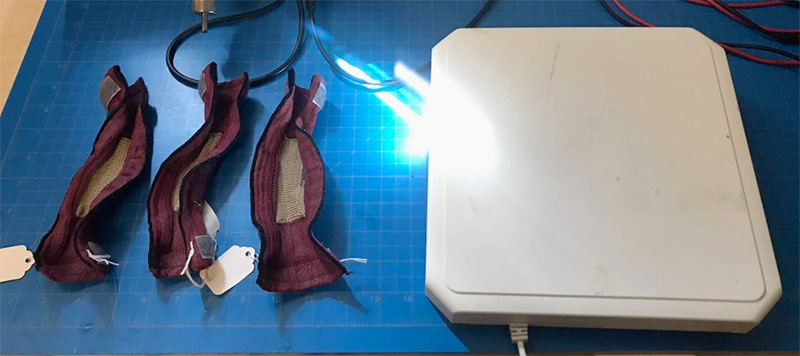As the COVID-19 pandemic enters its thirteenth month, many are starting to see light at the end of the tunnel, with vaccine rollouts helping protect an increasing number of people. But controlling the spread of the virus and treating those who become infected with it remains critical.

As the shape of the bands (left) changes, the included RFID tags communicate with an interrogator (right), which can translate the change to heart rate, breathing, contractions and more.
A team of Drexel Engineering students have developed a new framework to use technology developed by Drexel’s Wireless Systems Lab and Center for Functional Fabrics. The smart knitted fabric incorporates biomedical and sensor actuation applications to track a wearer’s respiratory rate, activity and temperature.
The students — computer engineering majors Celine Khoo and Daniel Rodriguez and computer science major Kristopher Lopez — have been earning recognition for their innovation. They were awarded the IEEE Philadelphia Section Merrill Buckley Jr. Student Project Award for their paper on the wearable, and the project was recognized by the IEEE Communication Society as an honorable mention in its ComSoc Student Competition, placing it among the top 14 projects worldwide and the top placing project from the United States.
“Smart textiles provide an exciting option to make necessary medical equipment more comfortable, more user-friendly, and as a result, more likely to be used,” Khoo says. “In 2019 Drexel’s own Dr. Kelly Joyce published a paper in Sociology of Health and Illness about this band and smart textiles and how they are received by the public. That research influenced our own and inspires much hope for a cozier, more comfortable take on health monitoring.”
In addition to monitoring vital signs, the band would use Bluetooth Low Energy to track potential exposures, in the same way that contact tracing apps on smartphones have been doing. The group believes that the combination of features would be especially helpful in protecting elderly populations.
“Smart textiles provide an exciting option to make necessary medical equipment more comfortable, more user-friendly, and as a result, more likely to be used.”
Celine Khoo
“We believe that this device would be really beneficial for people living in assisted living facilities and other care facilities, given their vulnerability,” Rodriguez says. “The-two pronged approach that we propose would help reduce risk overall and alert for signs of early detection.”
The band may not be able to be worn by patients and consumers in the near future — it is still in the research phase being done for the Wireless Systems Lab and Center for Functional Fabrics — but the group is excited that there is real-world potential for their developed feature in supplementing what has already been created, that also would be answering a critical need for future health crises. They say they’re equally pleased to receive recognition from their peers.
“We are honored to have been recognized on both an international level by the IEEE Communications Society and a local level by the IEEE Philadelphia Section,” Khoo says. “We’re incredibly grateful for all the support and guidance we’ve had from our mentors and advisors in the Wireless Systems Lab, without whom, none of this would have been possible.”